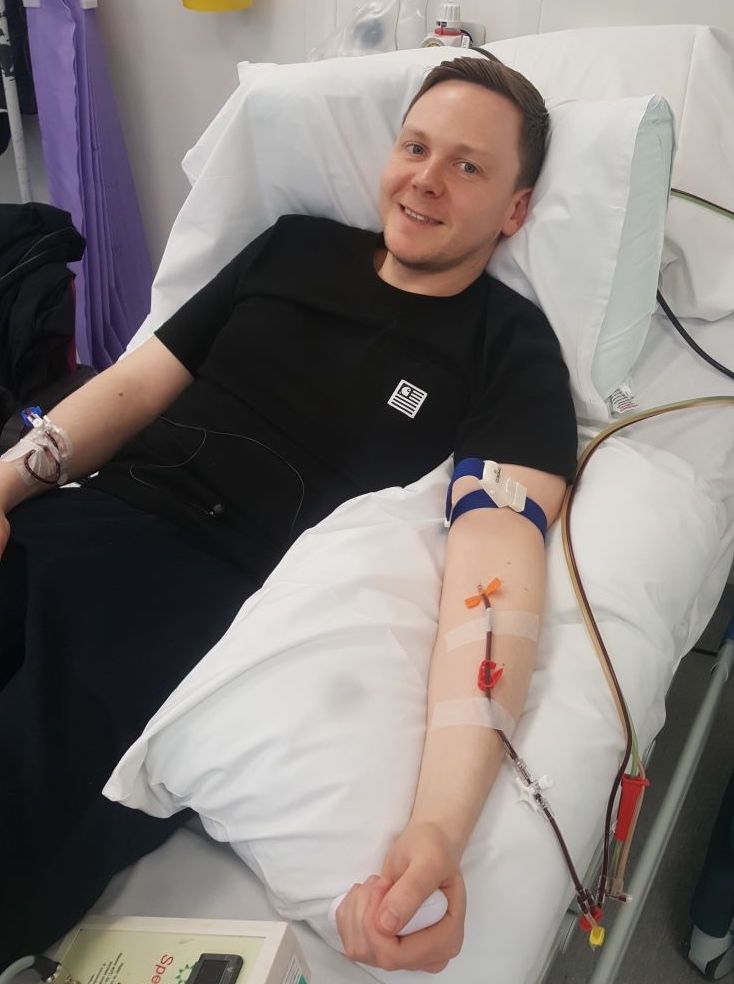Former Anthony Nolan staffer Francis Mason blogs about how doing something as simple as donating his stem cells turned out to be one of the most amazing things he's done.
I used to work for Anthony Nolan in their digital team and joined the register not long after starting, when I was 28. I had seen both the amazing stories of successful donations, like Sean and Johnny’s, and the impact this has on people’s lives, as well as the incredibly sad stories of those who hadn’t been able to find a matching donor in time.
I was really surprised when I got called up to say I was a match, over three years after joining the register, but I was also excited to be able to help someone. I got the call over Christmas in 2017, when I was sat in a pub in Newcastle waiting for a friend. It was the last thing I was expecting! But it never once crossed my mind that this was something I didn’t want to do. From working at Anthony Nolan, I knew how little time you have to take out of your life to donate, and how easy the process is. I felt lucky I had an opportunity to potentially save someone’s life.

Donating was really simple
The process of donating was really simple. I had some blood tests done and went for a medical check – the nurse was brilliant and explained everything to me, and really put my mind at ease about the whole process.
Once I had passed the medical check, I was given a donation date and a nurse came to my house to give me injections (to stimulate stem cell growth) for four days prior to donating. These injections didn’t hurt at all, but I did find that my back and ribs ached a bit (due to my bones going into overdrive creating stem cells!), but some paracetamol soon took care of that.
On the day of the donation in March 2018 I was quite nervous as I hate needles, but the donation itself was fine and actually didn’t really hurt at all! I had some minor discomfort from the needle in my arm but that was about it. I was just really happy that I was potentially going to save someone’s life – and reminded myself that this process was nothing compared to what I imagined the recipient and their family were going through.
A huge impact for someone else
Once it was over it took me a couple of days to recover. I mainly just felt fatigued. I live in London so I didn’t have to take much time out of my schedule to donate; in total, I had to take half a day off work for the medical check, and day off for the donation (I worked at home the next day as I basically felt fine), but that was it.
In the grand scheme of things, the whole process was a very minor inconvenience. It was little effort for something that could have a huge impact for someone else.
I found donating a bit of an overwhelming experience in a really positive way – knowing that you could possibly be saving someone’s life. I kept thinking about the recipient and wondering how they were and what they were going through, and hoping that this would give them the chance to live a normal life again.
One of the greatest things I’ve done
My family, friends and colleagues kept telling me how amazing what I’d done was, and how they were really proud of me, which was a great feeling. I’d be up for meeting the recipient, but I can only do that if they agree to it after two years have passed. Currently, I think we can send each other an anonymous card so I’ll probably send them something if I can. I really hope the transplant was a success for them.
The fact is, joining the register is incredibly easy. It takes five minutes – and to be honest, donating isn’t really that difficult either. If you’re male and under 30, especially, people who need a lifesaving stem cell transplant really need you. Personally, I feel like donating is one of the greatest things I’ve done in my life – the opportunity to save someone’s life and give them a second chance? It doesn’t get better than that.
#BeALifesaver is our campaign to let every young man aged 16–30 know the difference they could make by joining our stem cell register. Find out more, and you could be a lifesaver too.
